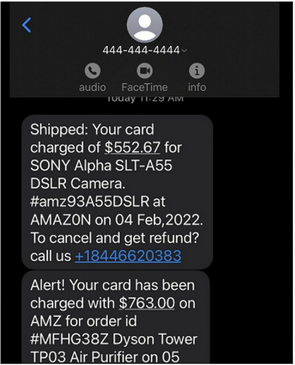Beware of Phishing Phone Scams
What are phone call scams?
This is an example of a false order phone scam from Amazon and Apple.
In this scam, if you pick up the phone you’ll find someone impersonating an Amazon customer support agent on the other end of the line. They’ll claim that an order for a $1200 iPhone 12 or another expensive product has been placed on your account. If you haven’t ordered an expensive product on Amazon recently, you’ll reasonably be alarmed by this news. The bad guys rely on your sense of fear and urgency to extract sensitive information from you over the phone. They can also intimidate you into buying gift cards and providing the redemption information to them.
Here are some ways to avoid an Amazon (or any company) impersonator scam:
- Never call back an unknown number. Use the official information on Amazon’s website and not a number listed in an unexpected email or text.
- Don’t pay for anything with a gift card. No real business or government agency will ever insist you pay them with a gift card. Anyone who demands to be paid with a gift card is a scammer.
- Don’t give remote access to someone who contacts you unexpectedly. This gives scammers easy access to your personal and financial information—like access to your bank accounts.
Phone scams may be an old trick, but they’re still common because they work. Always be suspicious of unsolicited calls, and err on the side of caution. The safest course of action is to NEVER provide any information to the caller and if necessary call the company at the official number posted on their real website. If you are being encouraged to act urgently and rapidly, or being asked to provide access to your device or to private information, hang up the phone immediately.
Text Message Scam
The premise is simple — hackers will send users text messages pretending to be Amazon representatives asking for a variety of different things, including fake reports of suspicious activity on one’s account or fake information about shipping delays or package arrivals. Oftentimes, hackers will include a hyperlink in the message which will either link to a site designed to appear as a legitimate login page or it can deploy some sort of malware onto the device to steal your information.
This is an example of an Amazon scam texts:

Amazon has setup a web site to help identify authentic communications
Email Scam
We have seen a lot of phishing scams pretending to be Best Buy Geek Squad invoices, McAfee Antivirus renewals, and Amazon invoices. Typically these come from generic Gmail accounts that have nothing to do with the real email accounts used by Best Buy, McAfee, Amazon, etc. They often also have strangely worded subjects and all the content of the message is an image. The premise is the same as the previous scams mentioned. They want you to reach out to them to question the “invoice” at which point they will “verify your payment details to ensure you get refunded.” This is all a scam and they are just trying to get your information for nefarious purposes. This can cost you a lot of money in bank charges, identity theft, and compromised accounts.
This is an example of a Best Buy email scam:
from: robertojames4982@gmail.com to: geeksquad@gmail.com date: Sep 27, 2022, 1:06:14 PM subject: Order Accepted for #GEEK SQUAD bill number _21837678394
Finally, we have warned about false job offer scams many times in the past. These are still the most common scam and you can read more about them here.
Use your best judgement when reviewing all email, texts and phone calls and if you ever have a question on the legitimacy of an email you can always contact the ITS Help Desk.

